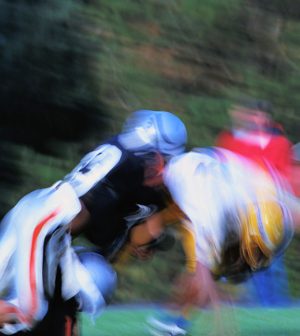- Could Your Grocery Store Meat Be Causing Recurring UTIs?
- Are You Making This Expensive Thermostat Error This Winter?
- Recognizing the Signs of Hypothyroidism
- 10 Strategies to Overcome Insomnia
- Could Artificial Sweeteners Be Aging the Brain Faster?
- Techniques for Soothing Your Nervous System
- Does the Water in Your House Smell Funny? Here’s Why
- Can a Daily Dose of Apple Cider Vinegar Actually Aid Weight Loss?
- 6 Health Beverages That Can Actually Spike Your Blood Sugar
- Treatment Options for Social Anxiety Disorder
Could Neck-Strengthening Prevent Some Concussions?

Boosting athletes’ neck strength in the off season might reduce their concussion risk in sports such as football and soccer, researchers say.
This is among several recommendations from researchers at Rutgers University in New Brunswick, N.J., who are looking to prevent these serious head injuries in athletes.
“Our ability to detect sports-related concussions has greatly improved, but our ability to prevent concussions and decrease post-injury outcomes remains limited,” said study lead author Allison Brown. She is an assistant professor in the School of Health Professions.
“We have identified neck strength, size and posture as potential factors that reduce risk by lessening the magnitude of force upon impact. Thus, increasing neck strength and possibly size could substantially reduce risk or severity of injury or outcomes,” Brown said in a university news release.
For the study, her team reviewed previous research on the relationship between sports-related concussion risk and neck strength, size and posture.
A neck that is stronger, thicker or in a forward posture — ears ahead of rather than aligned with the shoulders — may reduce the amount of energy transferred to the brain during an impact, reducing the risk and severity of concussion, said study senior author Carrie Esopenko, also an assistant professor in the health professions school.
Esopenko noted that compared with men, women typically have less neck strength and a higher risk of concussion, more severe symptoms, and a longer recovery.
Their other recommendations for physical therapists and athletic trainers include doing a thorough cervical spine assessment as part of the pre-athletic participation exam, and screening for pain. Pre-existing neck pain has been associated with increased concussion risk in young athletes, the study authors said.
A concussion occurs when an impact to the head makes the brain move within the skull. It can cause nausea, dizziness, problems with thinking, concentration and mood, and other neurological changes.
The study was published online Jan. 15 in the Journal of Orthopaedic and Sports Physical Therapy.
More information
The American Academy of Family Physicians has more on concussion.
Source: HealthDay
Copyright © 2026 HealthDay. All rights reserved.










